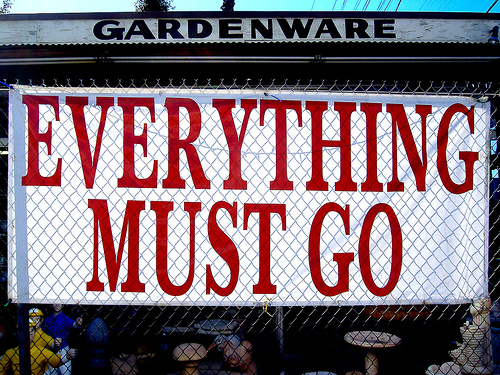We don’t shill for corporate products here on Control Your Cash, excluding the wonderful sponsors whose ads you can scroll down and see. (That’s VRBO.com, everyone! For your next vacation, rent someone’s home and eliminate the middleman!)
And Amazon. Our relationship with the Kindle is equivalent to Peter King’s with Brett Favre, except Favre might return some of King’s calls. As far as we’re concerned, being able to carry your entire library around with you in a device that weighs a few ounces is more impressive than anything Pioneer 11 did or might be doing.
Sometime last year, your humble blogger and his smartphone were perusing the stacks at a Barnes & Noble when a certain book caught our attention. Well, not only can you can get Wi-Fi inside Barnes & Noble, the company brags about it. Which means you can access Amazon.com, which means you can patronize a bookstore’s competitor while in that bookstore, and start reading the competitor’s books right away. Barnes & Noble even gives you a chair if you want it. It’s like they’re trying to destroy shareholder value.
And that’s Barnes & Noble, the corporate behemoth that smaller bookstores used to regard as the epitome of evil. What about those mom-and-pop operations themselves?
Pulitzer laureate Richard Russo spent 12 years in college and somehow never learned a thing about economics. Earlier this month, he bitched in the New York Times about how Amazon itself is now encouraging its customers to do what we figured out (and anyone else could) all by ourselves:
Amazon was encouraging customers to go into brick-and-mortar bookstores on Saturday, and use its price-check app (which allows shoppers in physical stores to see, by scanning a bar code, if they can get a better price online) to earn a 5 percent credit on Amazon purchases.
…
I wondered what my writer friends made of all this, so I dashed off an e-mail to Scott Turow, the president of the Authors Guild, and cc’ed Stephen King, Dennis Lehane, Andre Dubus III, Anita Shreve, Tom Perrotta and Ann Patchett.
(pause)
(Sorry, we were busy returning e-mails from our good friends Queen Elizabeth, President Obama, Paul McCartney, Tom Cruise, LeBron James, Oprah, and Angelina Jolie. Where were we?)
Assuming Russo is telling the truth, Scott Turow has no understanding of law nor of modern life. Turow responded:
… it’s worth wondering whether it’s lawful for Amazon to encourage people to enter a store for the purpose of gathering pricing information for Amazon and buying from the Internet giant
Not sure what statute Amazon would be violating there, unless they’re encouraging people to enter the stores and render the merchandise unsellable. But the brick-and-mortar bookstores are already doing that themselves, by pricing it too high. Russo continues, in his long-winded and quixotic manner:
A few miles down the road from where I live on the coast of Maine, a talented young bookseller named Lacy Simons recently opened a small bookshop called Hello Hello, and in her blog she wrote eloquently about her relationship to “everyone who comes in my store. If you let me, I’ll get to know you through your reading life and strive to find books that resonate with you. Amazon asks you to take advantage of my knowledge & my education (which I’m still paying for) and treat the space I rent, the heat & light I pay for, the insurance policies I need to be here, the sales tax I gather for the state, the gathering place I offer, the books and book culture I believe in so much that I’ve wagered everything on it” as if it were “a showroom for goods you can just get more cheaply through them.”
Opening a small bookshop in 2011 is like opening a Studebaker dealership in 1966. Or more aptly, a Borders store in 2011. Although we admire Ms. Simons for choosing a Gary dell’ Abate catchphrase for the name of her store.
Ms. Simons’s diatribe is why finance and economics courses should be required at every level of education. Hers is the same illogic echoed by so many of the Occupy Wall Street protestors: I invested in something (an impractical education, a business that can’t turn a profit), so regardless of that investment’s expected real-world return, if any, I demand a payout. Ms. Simons went to college (and financed her education, then took on still more debt before paying it off), and somehow Jeff Bezos and his silly computer engineering degree are “tak(ing) advantage” of her.
No successful businesswoman blames others for her own failure. Adapting to the reality of the market might not be fun, but it’s not like you have a choice in the matter. It’s like when Texas Instruments and their handheld calculators ran all the abacus makers out of business in the 1960s. Those people spent years learning how to put beads on strings in a wooden box, only to have TI, Casio and Sanyo “take advantage” of them. Didn’t the abacus makers have factories? And power bills? And insurance policies? So, so unfair.
As authors ourselves, we should mention that Amazon has been far friendlier to us than any retailer has ever been. We set up an account on Amazon, independent of our publisher, and now take home 70% of every book you buy. Meanwhile, trying to get our book on the shelves at local sellers was a gigantic pain. To do so you have to drive across town, hope you catch the appropriate store employee on the right day, and then, if she’s feeling particularly generous that day, she might offer to take 2 or 3 copies of your book and see if anyone buys them. Then, to find out if anyone does, you have to drive back and see for yourself (or call and waste some poor employee’s time.)
From the consumer’s perspective (and that’s a phrase many independent shopkeepers would have trouble understanding), which is easier:
a) Driving to a local store, stumbling across Control Your Cash: Making Money Make Sense by accident, thumbing through it and then buying it, or
b) Entering “personal finance” on Amazon.com, reading the reviews, then reading a sample, then having it wirelessly delivered in the time it takes you to wait in line at a retail store? For less than the retail store can sell it for? While giving the creator of the work a bigger cut than you give the middleman, if that’s the kind of thing that’s important to you?
It seems we’ve figured out why independent bookstores are doomed. Not just because their business model is obsolete, but the people running them are clueless.
**This article is featured in the Carnival of Personal Finance #342: Happy New Year Edition**





